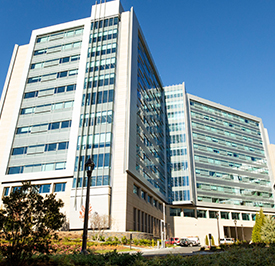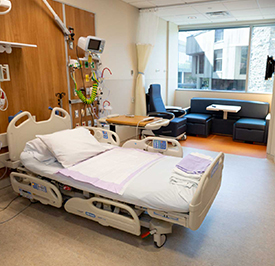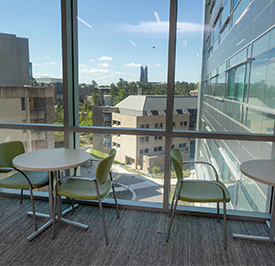
The First Year
During the first year of training, fellows gain a strong foundation in the management of both routine and complex pediatric infectious diseases. As noted, based on the fellows’ interests, we offer flexibility in scheduling inpatient ID service time based on their goals.
First-year fellows spend their clinical time managing patients on the general ID inpatient consult service and on the Immunocompromised/Transplant ID service, and are on call only one weekend per month. First-year fellows also spend two weeks in the clinical microbiology laboratory learning both classical and molecular diagnostic methods in bacteriology, mycology, mycobacteriology and virology. Our clinical microbiology laboratory is one of a handful of health systems in the US utilizing the Kiestra automated laboratory system (robotics), and one of a few clinical laboratories in the country with that system integrated into the electronic health record (Epic). This makes our interface with the clinical microbiology laboratory rapid and efficient. Our fellows also interact with the clinical microbiology faculty and fellows through monthly combined case discussions and conferences, enhancing education for fellows in both training programs. During the Microbiology rotation, fellows also have more indepth exposure to the Infection Control & Prevention and Antimicrobial Stewardship programs.
A Program that Empowers
Our program intentionally empowers fellows to take ownership of the management of patients, with faculty supervision always available. Fellows are encouraged to think critically about each consult question, formulate their own differential diagnosis, and create a diagnostic and treatment plan supported by the literature. This philosophy provides our fellows with the autonomy to function at a higher level more quickly and enables our fellows to develop the clinical decision-making skills that are critical for independent clinical practice. Fellows also directly supervise pediatric residents and Duke medical students in all clinical settings, gaining valuable experience leading a clinical team and teaching learners.
The Second and Third Year
During the second and third years of the fellowship program, inpatient coverage responsibilities will vary depending on the amount of service time covered during year 1. Generally, fellows prefer to do more of their service time in year one to afford more time for scholarly activity and coursework, if desired, in Year 2 and 3. fellows cover only one weekend per month. Second- and third-year fellows also spend two half-days per month in the outpatient clinic evaluating new patients and caring for a small panel of continuity patients. Fellows have unparalleled flexibility and protected time to maximize their research productivity or pursue graduate-level coursework. Many prior fellows have obtained advanced degrees (e.g. MPH, MSCR, MScGH) during fellowship, an accomplishment that is not possible in the vast majority of fellowship training programs. Additionally, prior fellows have pursued certification in the Medical Education Leadership Track (MELT) and received indepth Quality improvement training in the Pediatrics Improvement Science Leadership Course (ISLC), among other opportunities.
About our Patient Care
Duke University Medical Center is a nationally-recognized academic medical center with superb clinical and laboratory resources coupled with an intellectual environment that is supportive and conducive to fellowship training. Duke University Hospital is a tertiary and quaternary care center, consistently rated among the top hospitals in the United States. The current Duke Children’s Hospital offers all of the pediatric subspecialties, accommodates over 6,000 annual admissions (excluding healthy newborns), and recently moved to the Duke Central Tower – a new, state-of-the-art facility that includes 4 levels dedicated to pediatrics. The McGovern-Davison Children's Health Center is located adjacent to Duke University Hospital and serves as the site for ambulatory pediatric subspecialty care, with approximately 70,000 visits each year. ID patient consults range from complicated presentations of common infections to the unique problems seen at major referral centers, including multidrug-resistant pathogens and infections in immunocompromised patients. Illnesses that are endemic in the Southeastern US include Rocky Mountain Spotted Fever and Ehrlichiosis, and we are a major referral center for children living with HIV.



Dedicated to Immunocompromised Children
There is a clear national trend in pediatric ID toward specialized care for immunocompromised children. Duke Children’s Hospital has a large immunocompromised patient population, including:
- one of the nation's largest pediatric bone marrow transplant units
- a busy hematology/oncology service
- robust pediatric transplant services for
- liver
- intestinal
- multi-visceral
- kidney
- heart
- world’s largest number of transplant recipients with primary immunodeficiencies (SCID, CGD, etc)
- one of two sites in world performing thymic implantation for patients with DiGeorge Syndrome

We are one of few ID divisions with a dedicated pediatric Immunocompromised host ID service, staffed by a nurse practitioner and a full-time clinical faculty member. These providers integrate with other pediatric subspecialists through the Duke Pediatric Immunocompromised Host Program - the nation’s only multidisciplinary program that spans the Departments of Pediatrics and Surgery to include providers who care for children in the specialty areas of solid organ transplant, bone marrow transplant, oncology, immunology, and rheumatology. Patients cared for through this program, along with children in our neonatal intensive care unit, pediatric intensive care unit, and pediatric cardiac intensive care unit, comprise a large and varied population of immunocompromised patients at Duke.